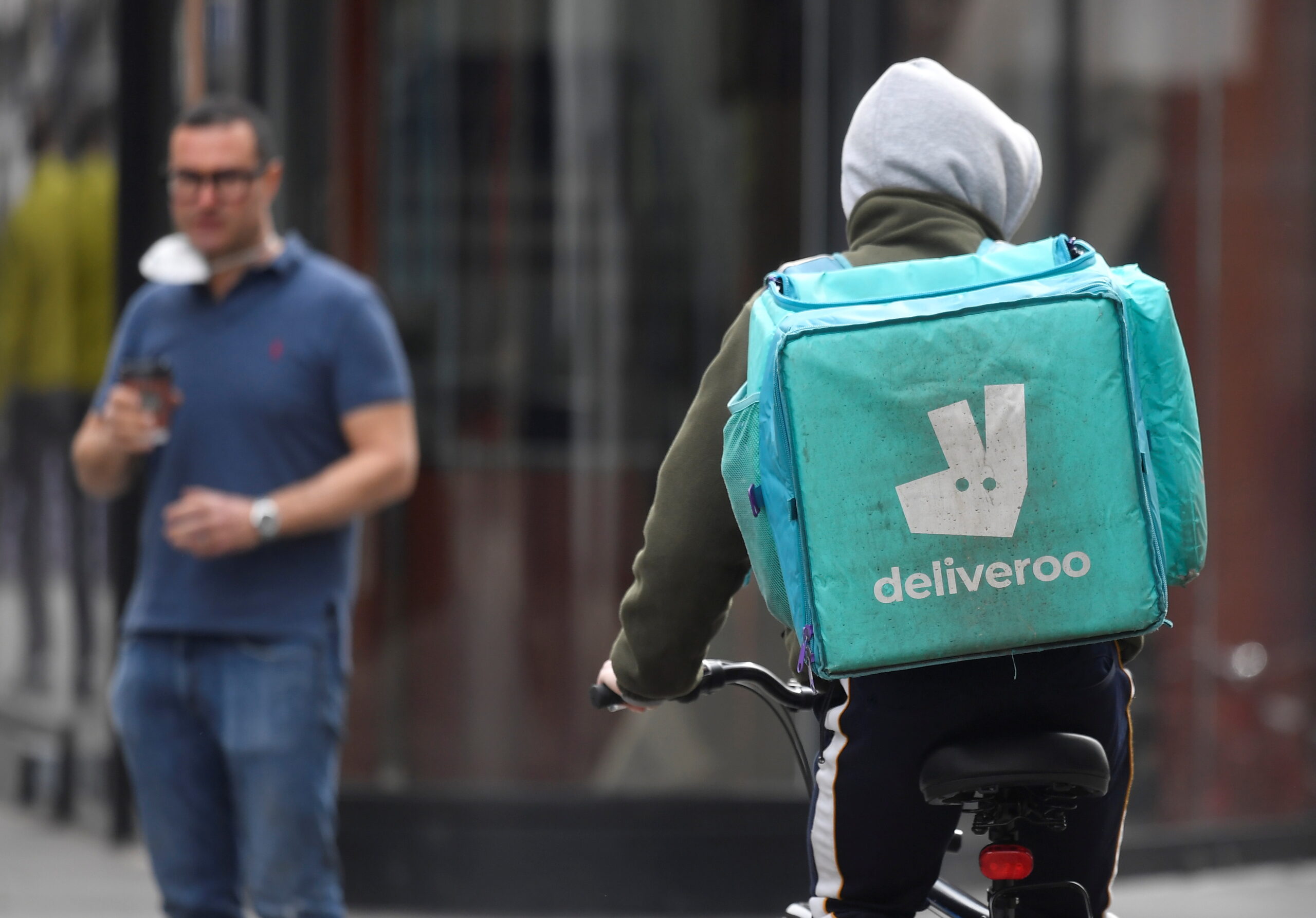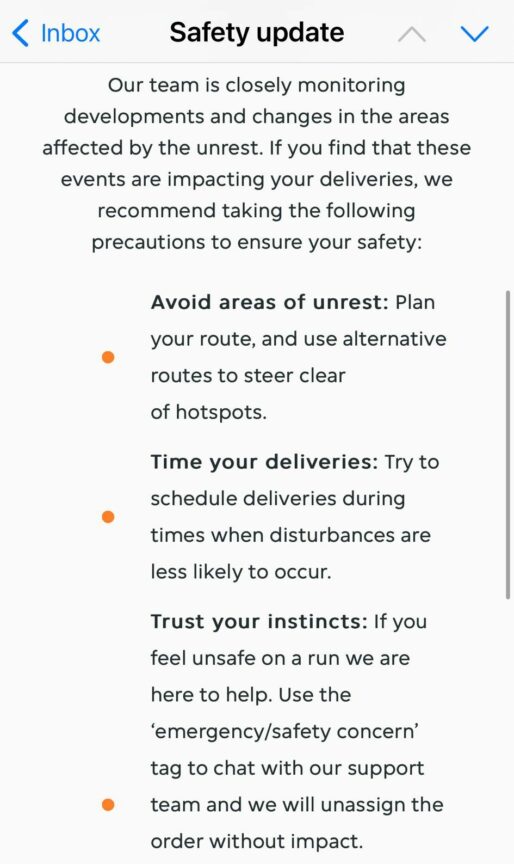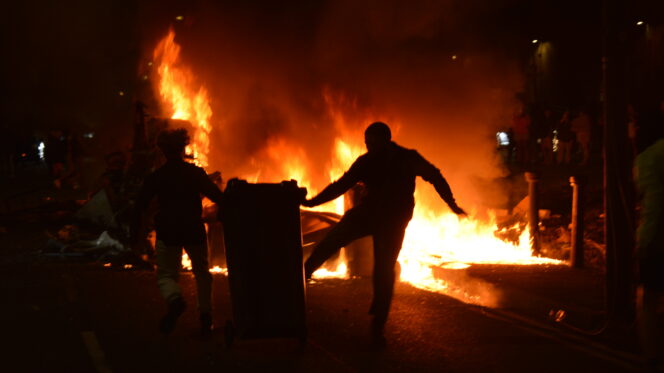Uber and Deliveroo Drivers Are Fearing for Their Lives – And the Apps Couldn’t Care Less

Far-right violence is forcing gig economy workers to choose between their safety and their income.
As the racist riots have spread from Southport to the rest of the UK, the predominantly migrant workforce fears that they will be targeted for harassment and assault on shift.
One courier told Novara Media of reports they had heard of an attack on a courier in Liverpool. On X/Twitter, editor of the Muslim media platform 5Pillars Dilly Hussain reported an attack on an Asian Uber driver in Sunderland. Novara Media has been unable to verify these claims.
While some platforms are now providing information about the riots, workers say they have been left to rely on informal in-person networks and WhatsApp chats to spread information and keep each other safe.
Mark*, who asked that we not use his real name out of concern for his safety, who is from Bulgaria, began working as a food delivery courier in Liverpool four years ago. He is no stranger to racism at work: last year, while waiting for an order in KFC, a customer told him to “go back home if he wasn’t happy” and called him a “fucking foreigner”.
Last Saturday, Mark went around Liverpool warning Muslim riders about the rioting that was spreading through the city.
“Everybody who I saw on the street, I was stopping them and telling them to go home,” he said. “About five o’clock, I told them to stop work and stay safe, not to move and work in a different area, but to just to go home straight away.”
Couriers argue that it is platforms’ responsibility to ensure riders know about dangerous areas – but that they aren’t getting any information.
“We received no message [on the platforms] to tell us to stay home, or to avoid certain areas,” he said. “They knew what was going on and they did nothing. They didn’t offer us any help or open a helpline for the situation. You can’t even contact Uber. There are no people, only chat bots. You’re not talking with live people.”
Uber posted an in-app message to couriers earlier this week: “It has been awful to see the events taking place this weekend across the UK.”
“At Uber, we are proud of the community of delivery partners who choose to help people get food and everyday essentials […] Whether you’re a delivery partner, a customer, a restaurant, or a merchant, everyone is expected to treat everyone else with respect, help keep one another safe, and follow the law.”
Uber Eats recommends riders call 999 if they are in immediate danger, and to “avoid travelling to places where there are reports of high tensions and potential unrest.
“Our team is regularly reviewing reports of potential unrest and will be taking action to minimise the chance of deliveries in affected areas.”
Deliveroo published a statement on its website on Tuesday, which was also emailed out to couriers, encouraging them to “go online only if you feel safe to do so,” to “avoid areas where there is a risk of unrest,” and that “if you choose to ride and feel unsafe at any time, make sure you get to safety as quickly as possible.”
The company, which describes itself as “rooted in local communities” and “appalled” by the “violent scenes” of rioting, added it would “continue to monitor the situation closely” and “may make changes to delivery areas if necessary to ensure the safety of our communities.”
Deliveroo told Novara Media that it had deactivated automated surges “for the time being,” in order to “safeguard against unintentionally encouraging riders to go into certain areas where riots may be taking place.”
On Wednesday afternoon, Just Eat sent out a “safety update” to all couriers, recommending they “schedule delivering during times when disturbances are less likely to occur” and “trust your instincts”.


But for Mark, this information has come too late. “I don’t feel safe,” he told Novara Media. “I’m thinking twice now before I go out.”
Ali*, a south Asian Muslim delivery rider who works in Rochdale and lives between there and Manchester, said: “After seeing the violent attacks that have taken place over the last few days, I don’t feel safe going out to work anymore.”
“Because of the colour of my skin, because of my chosen faith, I’m terrified to leave my house, knowing I could be targeted by thugs and put in harm’s way. I feel like I have no choice but to stay at home with my family and sacrifice my income in favour of our safety.”
Riders told Novara Media they were concerned that they would be penalised if they rejected deliveries in unsafe areas. Additionally, if an area is repeatedly rejected by riders, the delivery fee for that area increases, leaving desperate or uninformed riders to accept trips in potential danger zones.
Couriers fear that the riots could cause a spike in orders, as customers stay in to avoid potential violence. Novara Media has seen at least one social media post encouraging people to “stay inside and order Deliveroo” as a way of avoiding the riots.
For the Independent Workers Union of Great Britain (IWGB), the gig economy platforms have not gone far enough.
“Workers should not have to choose between risking their lives and making enough money to live,” Nader Awaad, chair of the private hire drivers branch, said in a statement.
Awaad outlined several demands workers have of the government and gig economy employers: urgently shut down deliveries in the areas at risk of violence; compensate the workers who miss shifts; remove penalties for workers turning down jobs; and compensate workers for any vehicle damage.
Food delivery couriers say that inflammatory anti-immigration rhetoric has put them at risk. In April, then immigration minister Robert Jenrick said that food delivery platforms were being “abused by illegal workers,” which was “allowing exploitation and putting the British public at risk.”
Under pressure from Jenrick to tackle “illegal working”, Uber Eats, Deliveroo and Just Eat agreed to begin conducting direct immigration checks on substitute riders, who can deliver orders using the app of someone directly engaged by the platform.
On Wednesday, Jenrick said that shouting the Arabic term “Allahu akhbar” (God is great) should be an arrestable offence; he has in the past repeated a far-right conspiracy theory of “two-tier policing.”
The IWGB said in a statement: “One look at the rhetoric used by politicians in recent years makes it blatantly clear that the seeds for this violence were sown by those at the top.
“For years we have seen the demonisation of migrants and racialised people by our political class and the media, fanning the flames of hatred by scapegoating Muslims, asylum seekers and migrants to distract from their own failures.”
This article was amended on 07/08/24 to include additional comments from Deliveroo.
Polly Smythe is Novara Media’s labour movement correspondent.


